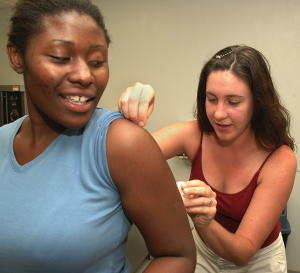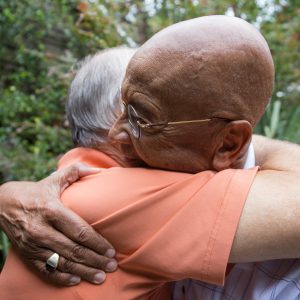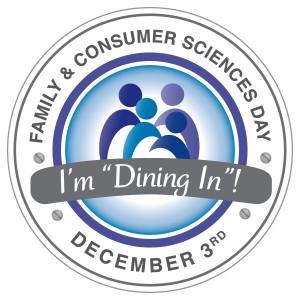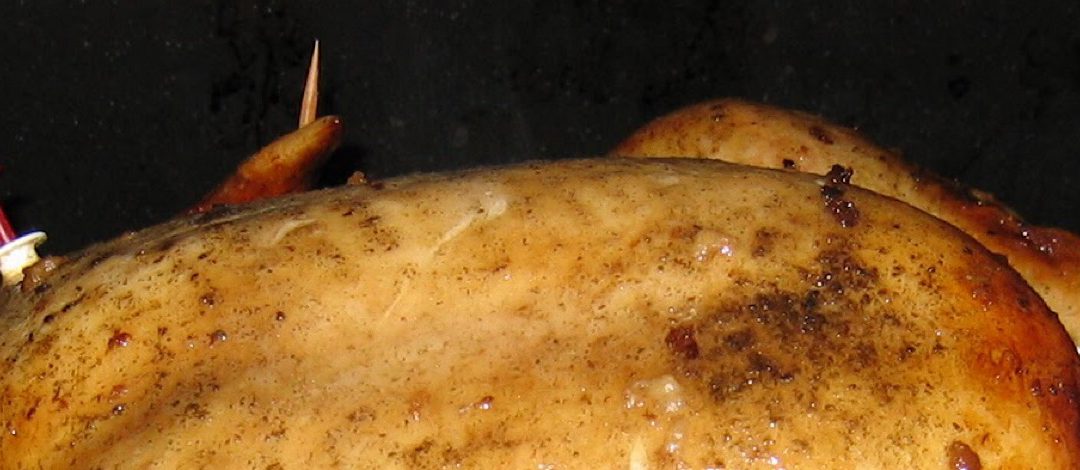
by Samantha Kennedy | Jan 13, 2020

A delicious cup of hot tea is a great way to start the day and can provide a daily dose of health-promoting antioxidants.
(Photo source: Samantha Kennedy)
For me, there’s nothing better than a hot cup of tea on a chilly morning – or any morning, really. The rich flavor and fragrant steam work together to perk me up and help me get ready to take on the day. And in the evening, a nice, warm cup of tea can also help me relax before settling down to sleep. The key is finding the right kind of tea for the task.
Types of Tea
There are five major types of tea: green, black, white, red, and herbal. All non-herbal teas are produced from the leaves of the warm-weather evergreen tea plant, Camellia sinensis. The degree of processing or oxidation of the leaves determines which type of tea is produced.
Green tea is very minimally processed and the leaves are not oxidized, which results in its light green color and delicate taste. Green tea is very low in caffeine. Green tea is very popular in Asian cultures, but has gained increased popularity around the world.
Black tea has a very rich flavor and the highest caffeine levels of all types of tea due to the long processing time. The leaves are fully oxidized, resulting in the rich amber color and rich flavor. Some of the most popular and common types of black tea are Early Grey, English Breakfast, and Darjeeling.
Red tea is oxidized for less time than black tea, resulting in a milder flavor and lighter color. The flavor intensity and caffeine levels of red tea fall somewhere between green and black tea. The most common type of red tea is Oolong, which is very popular in Asia.
White tea is produced from young tea leaves and unopened buds. The resulting brew has a velvety, delicate flavor and very light, “white” color. Since it is so minimally processed, it has very little caffeine.
Herbal tea is not produced from the leaves of the tea plant. Instead, herbal teas are created through a combination of herbs and other plants, often utilizing the leaves, stems, and roots. Herbal tea does not have caffeine and is often used medicinally to treat a variety of ailments.
Potential Health Benefits
The health benefits of tea, especially green tea, have long been touted. The fermentation process involved in green tea production increases the levels of a type of antioxidants called polyphenols, which can help reduce cell damage caused by the byproducts of regular cell production in the body.
According to two Harvard School of Public Health studies, those who drank tea regularly showed a decreased risk of developing Type 2 diabetes compared to non-tea drinkers. The substances in tea, such as polyphenols, have also been linked to lower risk of cardiovascular disease, cancer, and stroke and have been shown to help lower blood pressure and cholesterol.
One note of caution: Some chemicals in tea are known to bind to iron, thereby decreasing its absorption in the body. Those who suffer from iron-deficiency anemia may want to consult a physician before increasing their tea consumption.
Tea drinking is not a cure-all. However, drinking tea as part of an overall healthy diet may provide added health benefits that can help promote healthy cells and blood vessels.
So take the time to smell (and sip and savor) the tea while toasting to better health. Happy brewing!
Additional Resources:
Health benefits linked to drinking tea (Harvard Medical School)
Tea: A cup of good health? (Harvard Medical School)
Take Time for Tea: For Health and Well-being (North Dakota State Extension)
Extension classes are open to everyone regardless of race, creed, color, religion, age, disability, sex, sexual orientation, marital status, national origin, political opinions or affiliations.

by Melanie Taylor | Jan 9, 2020

One of the best ways to help prevent the flu this season is to get vaccinated. Even if you still get the flu, the severity and length of illness may be diminished. (Photo source: UF/IFAS file photo)
The holiday season has passed and now we are well on our way into 2020 with a very severe flu season. You are the best person at making sure you do not get the flu. Here are a few tips that you should consider as this flu season continues and still has not reached its peak.
- GET VACCINATED. It takes, on average, two weeks for the flu vaccine to reach its full potential, so if you have not gotten the flu shot, get it NOW. Even if you still get the flu, it will likely be shortened in time and strength if you are vaccinated.
- WASH YOUR HANDS. Washing your hands frequently will help protect you from the flu. If soap and water are not available, use an alcohol-based hand sanitizer.
- AVOID CLOSE CONTACT WITH PEOPLE WHO ARE SICK. Be sure to avoid direct contact with anyone that is sick. If you must come in contact with them be sure to wash your hands once you leave. If you are sick, keep your distance from others to protect them from getting sick too.
- AVOID TOUCHING YOUR FACE. Germs are spread quickly when a person touches something that is contaminated with germs and then touches his or her eyes, nose, or mouth. So make a conscious effort to keep your hands away from your face.
- COVER YOUR MOUTH AND NOSE WHEN YOU COUGH AND SNEEZE. Cover your mouth and nose with a tissue when coughing or sneezing, or sneeze/cough into your closed elbow. These steps may prevent those around you from getting sick.
- STAY HOME WHEN YOU ARE SICK. If possible, stay home from work and school when you are sick. This is the best way to avoid spreading your germs to other people. The CDC (Centers for Disease Control and Prevention) recommends you stay home for at least 24 hours after your fever is gone except to get medical care or for other necessities. They also recommend that your fever should be gone for 24 hours (without the use of a fever-reducing medicine) for you to no longer be considered contagious.
- PRACTICE GENERAL GOOD HEALTH HABITS. Clean and disinfect frequently touched surfaces at home, work, and school, especially when someone is sick. Wash backpacks, coats, and other items regularly. Get plenty of sleep, be physically active, manage your stress, drink plenty of fluids, and eat nutritious food.
Follow the tips above and maintain the best health practices possible and hopefully you will be one of the lucky people that avoids the dreaded flu this year. Wishing you all a healthy and happy 2020!
Source: https://www.cdc.gov/flu/prevent/prevention.htm

by Stephanie Herzog | Nov 27, 2019
The holidays are upon us! The holidays are a beloved time of year for many, but they are also a source of stress. Stress is defined by an individual’s values, beliefs, and perceptions, so it may look different to everyone. Whether you’re preparing for parties or family to come visit, dreading interacting with a certain family member, planning your holiday budget, or struggling with remembering a lost loved one, stress affects many people this time of year. Here are three tips for managing your stress this season.

Loving and caring relationships go a long way to relieve stress. (Photo Source: UF/IFAS)
1. Be Meta
Metacognition is thinking about your own thought processes. If you feel your stress winding up, stop and analyze your thought processes and the environment around you.
Ask yourself a question such as:
“Why I am feeling this way?” or “Why did I have this connecting thought and/or emotional reaction because of this specific event?”
Consciously recognize your signs of stress and do something about it:
“I’m feeling stressed because my muscles are tight and I’m irritable, so what is a healthy coping mechanism I like to use, and when can I take a break to go cope?”
Being more aware of your thoughts, feelings, and environment helps keep you in tune with managing your stress in a healthier way.
2. Take A Moment
Remember that to successfully help others, you first need to take care of yourself. The holidays make that even easier to forget, it seems. Too much psychological stress can lead to physical illness, which takes an even bigger toll on your overall well-being. So take a moment to yourself to refresh or recharge, whether it’s five minutes alone meditating or practicing mindfulness/awareness, going for a short walk, or taking an amazing 20-minute power nap. Reach out to friends and family to help you cover your responsibilities (such as caring for children), if needed, while you take a moment. Right now, I’d like you to take a moment and make a list of 3-5 simple things you can do to help yourself de-stress as the holidays approach, so you are armed with coping power when the stress arrives.
3. Don’t Deny
Denial is a poor stress management too; it’s a defense mechanism, not a healthy coping skill. It can be beneficial in the short-term, depending on the situation, but is largely harmful if used long-term. The refusal to believe there’s a problem only brings more stress. Not only does denial hurt you, but it hurts the people around you as well. Remember to trust those you love if they express concern about you or feel as though you’re denying something that’s negatively affecting you. Try not to defend yourself or attack them. First, take a step back, breathe in, and examine any validity to their claim with a good dose of humility. Chances are, they mean well and want to help, so it’s worth a self-examination. The ultimate goal is for you and your loved ones to be healthy and happy, and coping with stress positively is one great avenue to achieving that goal!
Enjoy yourself this time of year as you serve and spend time with others, but remember also to take care of yourself!
Source:
Boss, P. (2002). Family stress management: A contextual approach (2nd ed.). Thousand Oaks, California: Sage Publications.

by Laurie Osgood | Nov 25, 2019

Photo credit: UF/IFAS NW District
Rice and pasta are a staple of most family meals. But did you know these simple grains can lead to a foodborne illness? Uncooked rice and pasta can contain spores of Bacillus cereus, a bacterium that can cause foodborne illness. These spores can survive even when rice or pasta is cooked. If the rice or pasta is left standing at room temperature, like in a pot on the stove, these spores can grow into bacteria. These bacteria will then multiply and produce toxins (poisons) that can cause foodborne illness. Bacillus cereus, sometimes called B. cereus, can cause nausea, vomiting, and abdominal cramps.
Preventing Contamination by B. Cereus
Because B. cereus endospores are heat resistant, they are likely to survive cooking at temperatures that would destroy other foodborne pathogens. Bacillus cereus spores can grow when exposed to heat or improper handling.
Recommendations for Proper Handling of Rice and Pasta:
- Cook rice and pasta at 135ºF or above and maintain at that temperature outside of the refrigerator.
Serve rice or pasta as soon as it is cooked.
- Cool in the refrigerator at 41ºF or below within 2 hours of cooking.
- Store rice or pasta in the fridge using a shallow container or resealable bags.
- Cooked rice or pasta can be stored in airtight containers in the fridge for 3 – 5 days.
- Do not reheat rice or pasta more than once.
During the holidays, celebrations usually center around family and good food, and, therefore, our refrigerators easily can become full. We tend to leave rice or pasta out on the stove when there isn’t any room in the fridge. This is where the problem occurs. By following proper food handling techniques, you can ensure that everyone enjoys the holidays and the fabulous foods that are part of the festivities.
To learn more about Bacillus cereus or other foodborne illnesses, contact your UF/IFAS County Extension Office.
Resources:
UF/IFAS Electronic Data Information Source (EDIS), Preventing Foodborne Illness: Bacillus cereus
The Number of Food Poisoning Cases Caused by Bacillus cereus is on the Rise. (2015, April 1). Infection Control Today. Retrieved from https://www.infectioncontroltoday.com/food-safety/number-food-poisoning-cases-caused-bacillus-cereus-rise

by Angela Hinkle | Nov 21, 2019
Make the pledge Tuesday, December 3rd to Dine In for better health – physical, social, and cultural.
Why
Most of us eat every day without thinking about it. We need to eat to nourish our body, so it’s just a regular thing we do. But eating also can be an important social and cultural way for families to come together.

FCS Dine In Day
When we eat together as a family, it gives us the opportunity to practice cultural traditions and share food histories. We get the chance to explore new foods and learn new skills – like eating with chopsticks. We may get the chance to learn and practice table manners and learn literary and conversation skills. Paul Fieldhouse of the Vanier Institute of the Family says, “For young children, ‘table talk’ may be the main source of exposure to family conversation and the expression of thoughts, ideas, and emotions.” Eating the family meal also can help us de-stress by setting a reassuring rhythm and structure to our day.
Eating family meals at home has additional benefits. The University of Washington found that families who cook and eat more often at home tend to eat a healthier diet. Their Healthy Eating Index is high – meaning they eat more fruits and vegetables and less calories, sugar, and fat. They eat smaller portions helping to regulate weight. Some research suggests we eat smaller portions at home because we eat more slowly and talk more. This, however, does not equate to a higher cost. Meals cooked at home generally cost less than those eaten out.
How
So, how can your family eat more meals together at home?
- Try making and eating meals at home a priority for your family. Think about how important it is spending time together.
- Keep it simple. Don’t worry about making a big, fancy meal.
- Start with just a few meals a week. Then slowly add more meals together as you find your “family meal groove.”
- Let the whole family help plan meals. Think about foods your family likes and build around those ideas. Try to get all the MyPlate healthy food groups in – whole grains, plenty of fruits and vegetables of all colors, shapes, and textures, lean plant and animal proteins, and low- and no-fat dairy. Make your grocery list together.
- Let everyone be involved in planning, preparing, table setting, and cleaning up afterwards.
- Make it a goal to start this December 3rd to Dine In for better health.
Resources:
(Still) Eating Together: The Culture of the Family Meal. Retrieved November 16, 2019 from https://vanierinstitute.ca/eating-culture-family-meal/
Cooking at Home Tonight? It’s Likely Cheaper and Healthier. Retrieved November 15, 2019 from https://www.sciencedaily.com/releases/2017/03/170314150926.htm

by Kendra Hughson | Nov 8, 2019
You have your frozen turkey. Now what? Plan ahead to be sure your bird is safe and ready to cook. Do not thaw your frozen turkey on the counter. All parts of the turkey must be kept at a safe temperature during the thawing process and cooked immediately after thawing. Use one or a combination of the following recommended methods:
Refrigerator Thawing

Thaw your turkey safely. Photo Credit: Kendra Zamojski
Keep the turkey in the original wrapper, placing on a tray to catch any leaking juices. Allow approximately 24 hours for every 4 to 5 pounds. For example, a 12-16-pound turkey may take 3 to 4 days to thaw. A properly thawed turkey will keep in the refrigerator for 1 to 2 days before cooking.
Thawing In Cold Water
Keep the turkey in the original wrapper and place in a larger sealed, leak-proof plastic bag. Submerge in cold water, changing the water every 30 minutes, until thawed. Allow 30 minutes per pound, so a 12- to 16-pound turkey would take 6-8 hours to thaw. A properly thawed turkey can be stored in the refrigerator.
When it’s Ready to Cook
When the turkey is ready to cook, don’t rinse it. You could splash salmonella and other bacteria around your kitchen. Cook your turkey to the proper temperature. Use a food thermometer to be sure the inner thigh, the inner wing, and the thickest part of the turkey breast are all cooked to at least 165°F.
For more information, contact your local UF/IFAS Extension office.
Sources:
UF/IFAS: Food Safety Tips for the Holiday Season
USDA: Let’s Talk Turkey
USDA: Tips and Resources for a Bacteria-Free Thanksgiving












